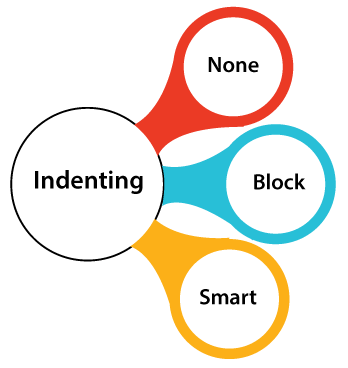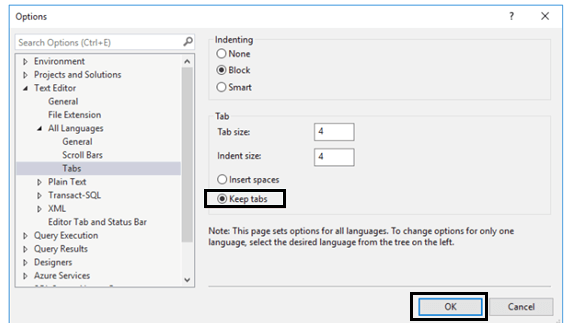SQL FormatterThe lengthy code becomes difficult to interpret. There is a large amount of unformatted SQL code while reading SQL scripts, which are difficult to reduce and understand. The Formatting options in SQL makes the work easier for us. SQL FormatterSQL Formatting is a slow process. Many formatting tools are used to speed up the formatting process. The features of SQL Formatter are listed below:
Now consider the indentation of the code using the SQL Formatter, which is given below. Indentation of code using SQL FormatterThere are three types of indentation used in the SQL server in this code. First is None, second is the Block, and the third one is Smart. These settings of indentation for individual text formats dispute with each other. 

1. None: When we press the Enter key, the cursor moves to the starting of the next line, when the "None" option is selected from the indentation. 
2. Block: When the block option is selected, press the Enter key. The cursor in the next row attaches to its first column. 
3. SMART: SMART is the default indenting option in SQL, which automatically decides on indent styles. Next, we can define tab space to create an indentation. Here is a sampling screenshot to determine the tab location in SQL Server using the SQL Server. 
Features of FormatterIt is used to embellish SQL statements. The formatter formats the code naturally, and the functions are based on simple algorithms. The format and ornamental code are based on fundamental rules, which helps in writing SQL code. It is recommended to use SQL Formatter to manage the code well, whenever the code is complex and deeply nested. It gradually adds new links to break the functional order into the visual blocks. Therefore, the SQL formatter modifies the functional depth of the statement by grouping the blocks.
We are required to understand the core concept of the formatter. The example is given below: The query SELECT a FROM t, .There are many possible ways to read or edit the query. We have three possibilities to render the same query. So, this is the first method that is easier to understand and also takes less space. The above statement has four words. The words in the first option can be read easily. If we enlarge the complexity of the query, what will happen? For example, some filters, columns, subqueries, and different depth pairs can be added to the same query. As the query gains complexity, it justifies more space. Here, we have to add more rows of space, exposing subfields, and indenting other blocks. Set the indent width to 50 and consider the working of the query in the example below. We are comparing Mongo DB and Dynamo DB below:We have three result sets in the above example that are well intended. The query maintains a good understanding with a good balance of the available space. We have to use a simple query to focus on the output that can change with the complexity. When we use the Formatter tools, a box is used to copy and paste the SQL code. SQL statements use a semicolon, which supports multiple statements that can be easily separated. The slider controls the maximum line width, which is needed in the characters used at the bottom of the box. The side control tab has many options, such as indentation, space, tab, alignment mode, etc. The keyword "simplify" in the SQL formatter removes the undesired parenthesis or words with same meaning. There are four alignments, which are given below.
Implementation of SQL FormatterSQL formatter working is based on an algorithm to show the documents in many formats. The most challenging part of SQL formatter is to parsing and converting text into memory data structures. Parsed data defines the final output, which can adapts easily. Generally, the Formatter calculates the results quickly based on possible placements for the new line. It has text and indentation, or the combination of both. These operators are used in the correct order for proper functionality. We have to use some new operators to perform some extra functionality.
Next TopicSQL Tutorial
|
 For Videos Join Our Youtube Channel: Join Now
For Videos Join Our Youtube Channel: Join Now
Feedback
- Send your Feedback to [email protected]
Help Others, Please Share









